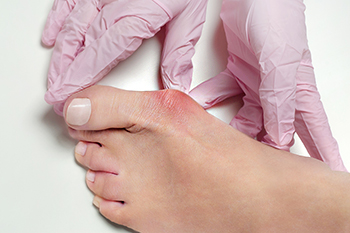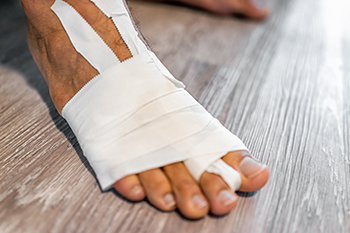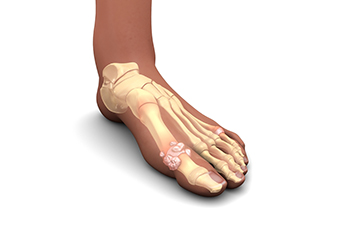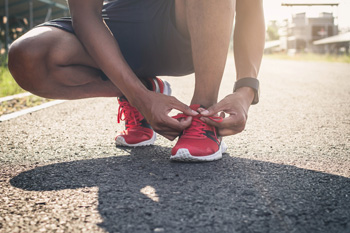
(908) 381-8160Berkeley Heights

A bunion is a bony bump that develops on the side of the foot, near the base of the big toe. Bunions often cause pain and present challenges when wearing shoes. Bunion surgery may become necessary if non-surgical treatments, such as wearing wider shoes, padding, or toe spacers are not effective in relieving pain. The goal of bunion surgery is to realign the bones, remove the bony lump, and restore the normal function of the toe. Without surgery, bunions tend to worsen over time and may lead to further complications, like joint pain or inflammation. A podiatrist can guide you through both surgical and non-surgical options to help manage the condition and improve your comfort. Deciding on surgery depends on factors like pain levels, activity limitations, and the progression of the bunion. If you are uncertain about bunion surgery, it is suggested that you make an appointment with a podiatrist for an exam, diagnosis, and treatment options.
If you are suffering from bunions, contact Dr. Janet Leicht of New Jersey. Our doctor can provide the care you need to keep you pain-free and on your feet.
What Is a Bunion?
A bunion is formed of swollen tissue or an enlargement of boney growth, usually located at the base joint of the toe that connects to the foot. The swelling occurs due to the bones in the big toe shifting inward, which impacts the other toes of the foot. This causes the area around the base of the big toe to become inflamed and painful.
Why Do Bunions Form?
Genetics – Susceptibility to bunions are often hereditary
Stress on the feet – Poorly fitted and uncomfortable footwear that places stress on feet, such as heels, can worsen existing bunions
How Are Bunions Diagnosed?
Doctors often perform two tests – blood tests and x-rays – when trying to diagnose bunions, especially in the early stages of development. Blood tests help determine if the foot pain is being caused by something else, such as arthritis, while x-rays provide a clear picture of your bone structure to your doctor.
How Are Bunions Treated?
If you have any questions, please feel free to contact our office located in Berkeley Heights, NJ . We offer the newest diagnostic and treatment technologies for all your foot care needs.

Turf toe is a common foot injury, particularly among athletes who play on artificial turf. It occurs when the big toe is forcibly hyperextended, causing damage to the ligaments at the base of the toe. Symptoms of turf toe include intense pain at the base of the big toe, swelling, bruising, and difficulty moving the toe. This injury can lead to complications such as joint instability and chronic pain if not properly treated. Diagnosing turf toe typically involves a physical examination by a podiatrist, who will assess pain, swelling, and range of motion. In some cases, imaging tests like X-rays or MRI scans may be used to evaluate the extent of ligament damage. If you are experiencing toe pain, it is suggested you schedule an appointment with a podiatrist for a comprehensive evaluation and personalized care plan.
Toe pain can disrupt your daily activities. If you have any concerns, contact Dr. Janet Leicht of New Jersey. Our doctor can provide the care you need to keep you pain-free and on your feet.
What Causes Toe Pain?
Most severe toe pain is caused due to a sports injury, trauma from dropping something heavy on the toe, or bumping into something rigid. Other problems can develop over time for various reasons.
Toe pain can be caused by one or more ailments. The most common include:
When to See a Podiatrist
Diagnosis
In many cases the cause of toe pain is obvious, but in others, a podiatrist may want to use more advanced methods to determine the problem. These can range from simple visual inspections and sensation tests to X-rays and MRI scans. Prior medical history, family medical history, and any recent physical traumatic events will all be taken into consideration for a proper diagnosis.
Treatment
Treatments for toe pain and injuries vary and may include shoe inserts, padding, taping, medicines, injections, and in some cases, surgery. If you believe that you have broken a toe, please see a podiatrist as soon as possible.
If you have any questions please feel free to contact our office located in Berkeley Heights, NJ . We offer the newest diagnostic tools and technology to treat your foot and ankle needs.

Gout, a form of arthritis causing sudden, severe pain and swelling in the joints, has a notable genetic component. Research indicates that individuals with a family history of gout are at a higher risk of developing the condition themselves. This genetic predisposition often involves variations in genes that affect the body's ability to regulate uric acid levels. Elevated uric acid, which can form painful crystals in the joints, typically in the big toe, is a key factor in gout. Genetics may influence how the body processes purines, which are substances found in certain foods that can contribute to uric acid buildup. While genetics play a significant role, lifestyle and dietary choices also impact the likelihood of developing gout. Understanding this connection can help in managing and preventing the condition through both genetic awareness and proactive lifestyle adjustments. Gout can cause severe pain and discomfort. If you have had one or more gout attacks, it is strongly suggested that you are under the care of a podiatrist who can help you manage this condition.
Gout is a painful condition that can be treated. If you are seeking treatment, contact Dr. Janet Leicht from New Jersey. Our doctor will treat your foot and ankle needs.
What Is Gout?
Gout is a form of arthritis that is characterized by sudden, severe attacks of pain, redness, and tenderness in the joints. The condition usually affects the joint at the base of the big toe. A gout attack can occur at any random time, such as the middle of the night while you are asleep.
Symptoms
Risk Factors
Prior to visiting your podiatrist to receive treatment for gout, there are a few things you should do beforehand. If you have gout you should write down your symptoms--including when they started and how often you experience them, important medical information you may have, and any questions you may have. Writing down these three things will help your podiatrist in assessing your specific situation so that he or she may provide the best route of treatment for you.
If you have any questions, please feel free to contact our office located in Berkeley Heights, NJ . We offer the newest diagnostic and treatment technologies for all your foot care needs.

Choosing the right running shoes is essential for comfort, performance, and injury prevention. Start by considering where you will primarily be running. For example, for road running, look for shoes with good cushioning and flexibility to handle hard, even surfaces. If you will be running on trails, opt for trail shoes with better grip, stability, and protection against rocks and uneven terrain. The distance you plan to cover also influences your choice. Longer distances typically require shoes with more cushioning to reduce fatigue, while shorter runs may benefit from lighter, more responsive shoes. The fit is important. There should be enough room in the toe box, your heel should feel secure, and the shoe should support your arch type. When trying on shoes, wear the socks you plan to run in and test them later in the day when your feet are slightly swollen, ensuring a proper fit. Running shoes should be replaced every 400 to 500 miles to maintain optimal support and cushioning. If you incur a foot or ankle injury while running or need further advice on choosing proper running shoes, it is suggested that you visit a podiatrist.
If you are a runner, wearing the right running shoe is essential. For more information, contact Dr. Janet Leicht from New Jersey. Our doctor can provide the care you need to keep you pain-free and on your feet.
Choosing the Right Running Shoe for Your Foot Type
To increase performance and avoid the risk of injury, it is important to choose the right running shoe based on your foot type. The general design of running shoes revolves around pronation, which is how the ankle rolls from outside to inside when the foot strikes the ground.
If you have any questions please feel free to contact our office located in Berkeley Heights, NJ . We offer the newest diagnostic and treatment technologies for all your foot and ankle needs.